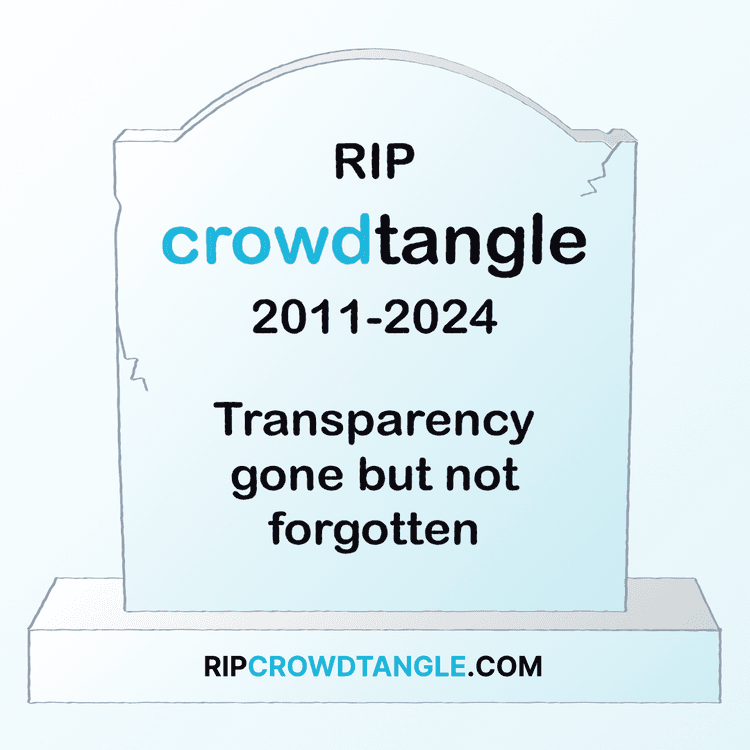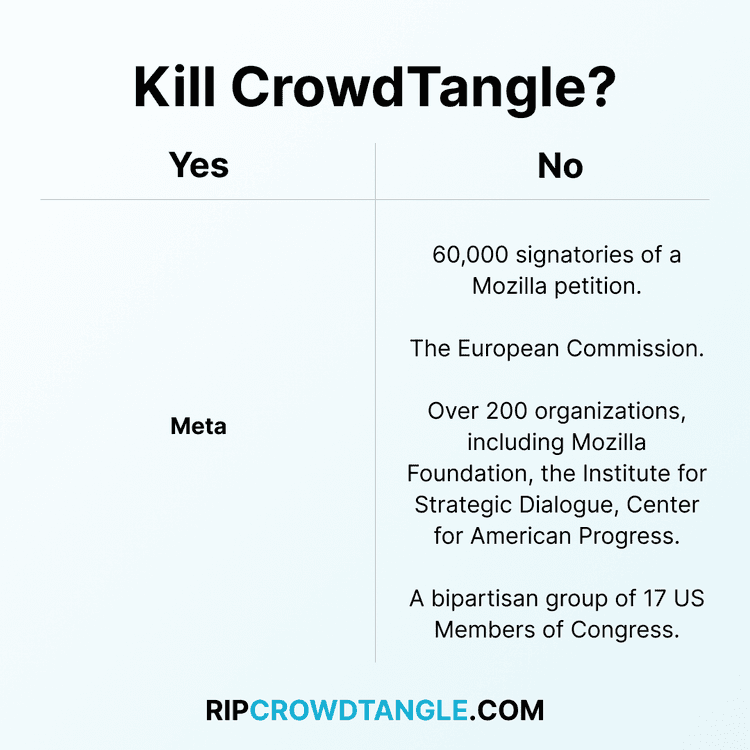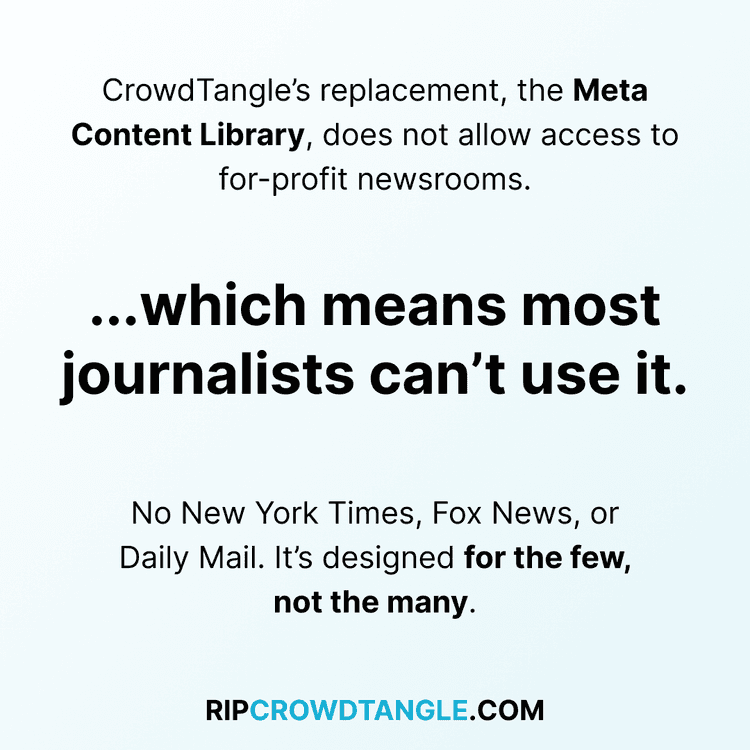On August 14, Meta killed their leading transparency tool — right in the middle of the biggest election year ever.
CrowdTangle was a critical tool that researchers and journalists used to investigate the spread of information on Facebook and Instagram.
Thousands of people around the world used it to uncover foreign interference in elections, track extremists operating online, monitor the spread of hate speech, and much more.
Join the funeral on 30 SeptemberLosing CrowdTangle is a huge and exhausting setback in our hate speech research. This is yet another infuriating reminder that social media companies should not be dictating the parameters of the research that investigates them.

Dylan K. Baker
DAIR Institute
CrowdTangle is crucially important to researchers internationally. I mourn its loss as it will have a profound impact on our ability to scrutinize power, not just that of the platforms, but corporations and politicians who seek to manipulate and deceive us all.
 Emma L. BriantMonash University, Australia
Emma L. BriantMonash University, AustraliaWithout a window into the platforms, it's next to impossible to tell how far and wide false claims have circulated and whether other fabrications are gaining traction. In shutting down CrowdTangle, Meta closed the small window that we once had.
 Julia AngwinProof News
Julia AngwinProof NewsAs a fact-checking journalist, I used CrowdTangle every day. In one story, I used it to analyze the trend of staged dramatic videos posted by verified Facebook accounts in India and how such videos are often used to target minorities, especially the Muslim community. When Meta pulls the plug from CrowdTangle, Mark Zuckerberg makes it clear he does not want Meta to be held accountable to keep our internet safe.
 Archit MehtaGeorgetown University
Archit MehtaGeorgetown UniversityCrowdTangle was instrumental to my public health research. I used it for several tobacco control studies. Shutting down this tool will be a huge loss to researchers. The new tool they are offering simply does not have the flexibility needed, especially to facilitate qualitative content analysis.
Linnea LaestadiusUniversity of Wisconsin MilwaukeeFor the past several years, we have used CrowdTangle to gather the posts of candidates for national office in democracies all around the world in order to study the negative effects of populism on democracy. Without access, this research, funded by both NSF and the Carnegie Corporation, has now ended.
 Jacob MontgomeryWashington University in St. Louis
Jacob MontgomeryWashington University in St. LouisThe CrowdTangle browser plugin was one of the most useful tools for identifying inauthentic networks on Facebook. It was a "one click and have the network mapped out" tool. And it was essential in my work identifying networks which Meta later actioned. There really is no replacement for it.
 Jeff AllenIntegrity Institute
Jeff AllenIntegrity InstituteAs a fact checker and social media researcher in South Asia, CrowdTangle was a tool that I used daily, it helped me track far-right accounts in India during the elections and COVID pandemic, similarly during the 2019 bombing in Sri Lanka and so on.
 Uzair RizviDataLEADS
Uzair RizviDataLEADSThe Civic Tech Lab at National University of Singapore used CrowdTangle to access multi-lingual and multi-modal content on issues such as Covid-19 and StopAsianHate. Following the closure of CrowdTangle, platforms' doors to researchers from the Global South are shut even further.
 Weiyu ZhangNational University of Singapore
Weiyu ZhangNational University of Singapore
We have been using CrowdTangle to monitor Turkish news and pinpoint disinformation and propaganda campaigns, especially during elections. Now we are largely unable to do it.
 Emre KizilkayaJourno.com
Emre KizilkayaJourno.comTools like CrowdTangle were the public's lens into the digital dynamics shaping democracy, revealing the interplay between Meta's platforms and societal discourse. Its unilateral removal underscores just how distant we remain from a tech governance model that prioritizes the common good.
 Alissa CooperKnight-Georgetown Institute
Alissa CooperKnight-Georgetown InstituteMy team has used CrowdTangle to collect public political communication around elections in Finland, from both parties, individual candidates and NGOs, on Facebook and Instagram. CrowdTangle provided an easy and reliable way to access such data, also in ways and formats accessible for non-computational team members.
Salla-Maaria LaaksonenUniversity of HelsinkiAs an independent researcher who has no funding, I rely on low-cost and easy access to data that CrowdTangle has provided. When it shuts down, I'll likely have to discontinue my work.
Amy RuckesWe used CrowdTangle to conduct research about how political candidates utilized different platforms for different mobilization efforts. We also used CrowdTangle to study news organizations and influencers. All of these individuals are public figures, and it has become much harder to systematically study them.
 Josephine LukitoMedia and Democracy Data Cooperative
Josephine LukitoMedia and Democracy Data CooperativeOur newsroom recently used CrowdTangle to expose a disinformation operation targeting the UK race riots on Facebook that was being managed out of Africa. Many of us here have used this tool before for similar investigations and we're concerned that Meta's replacement (the Meta Content Library) will make this kind of investigative work much harder with the replacement only being accessible to vetted researchers.
Michael WorkmanABC News AustraliaCrowdTangle has facilitated external evaluation of Facebook's attempts to control misinformation throughout the COVID pandemic. It enabled novel psycholinguistic research in how people make sense of social media, lending crucial external validity to scientific theory. It provided a transparent approach to studying coordinated inauthentic behavior. And so much more.
 David BroniatowskiThe George Washington University
David BroniatowskiThe George Washington University
At the University of Wisconsin's Mass Communication Research Center we have used CrowdTangle to retrieve public-facing posts from Facebook and Instagram on topics like #MeToo, Gun Violence, Presidential Debates, Immigration, and Vaccines (HPV, COVID, MMR). Access loss will slow research on social media discourse flows and their consequences.
 Dhavan ShahUniversity of Wisconsin's Mass Communication Research Center
Dhavan ShahUniversity of Wisconsin's Mass Communication Research CenterHeartbroken by CrowdTangle's shutdown. It has been essential for our organization, especially in news gathering during disasters like earthquakes, super typhoons, the pandemic, and the Philippines elections. It was our go-to tool for real-time, reliable information. Its loss is a huge blow to our work.
 Charlotte
CharlotteCrowdTangle allowed many different groups to use their expertise in protecting our online environment - they didn't need technical specialists, or to spend hours working out how to get data. But now Meta, like other tech companies, is choosing to make this valuable work much harder.
 Oliver MarshAlgorithm Watch
Oliver MarshAlgorithm WatchWith CrowdTangle gone, our Top FIBers project at the Observatory on Social Media—which tracked Facebook's top superspreaders of low-credibility news content each month—can no longer continue. The tool's domain-specific search was essential; without it, we cannot sustain this critical public service as no viable alternatives exist.
 Matthew DeVernaObservatory on Social Media at Indiana University
Matthew DeVernaObservatory on Social Media at Indiana UniversityCrowdTangle was a window into Facebook's impact on our society — a view that, in hindsight, might be why Meta found it so undesirable. This experience has shown me never to settle for voluntary access to that which makes accountability possible. Accountability requires obligatory transparency.
 E. Rosalie LiInfoEpi Lab
E. Rosalie LiInfoEpi LabWe used CrowdTangle for various research projects at GESIS; most recently for collecting data on the German candidates in the 2024 European Parliament election. CrowdTangle was easy to access and use, and I am currently skeptical whether the new Meta Content Library can fully replace it.
 Johannes BreuerGESIS – Leibniz Institute for the Social Sciences
Johannes BreuerGESIS – Leibniz Institute for the Social SciencesThrough the Illuminating Project (illuminating.ischool.syr.edu), we have built an archive and dashboard of U.S. political campaign messaging to support research and reporting to hold politicians accountable. The end of CrowdTangle at the height of the U.S. campaign hinders our ability to support social science and journalistic efforts to promote transparency.
 Jennifer Stromer-GalleySyracuse University
Jennifer Stromer-GalleySyracuse University
Here's What You Should Know
#1: Meta's choice has endangered society at a critical time
Killing CrowdTangle undermines transparency on Facebook and Instagram at exactly the moment when we need it the most, with hundreds of millions of people around the globe going to the polls.
Read our impact report#2: Meta knows the damage they’re causing
Hundreds of people — including researchers, policymakers in the US and Europe, fact-checkers and civil society organizations — explained the damage this would cause, and called on Meta to reverse course. They didn't budge.
View a timeline- 📢
Meta announces that they will shutdown CrowdTangle on 14 August 2024
- ✉️
Mozilla and over 180 organisations and researchers send a letter to Meta calling on them to keep CrowdTangle on through 2025 and to dramatically improve the Meta Content Library, including by making it accessible to a wider array of researchers and improving key functionalities that the tool offers
- 🖊️
56,000 people sign a petition launched by Mozilla calling on Meta to keep CrowdTangle alive through the 2024 election year
- ⚖️
European Commission opens formal proceedings against Meta for numerous suspected infringements of the DSA, including the planned shutdown of CrowdTangle
- ✉️
Institute for Strategic Dialogue and Center for American Progress send a letter to Meta on behalf of 51 organizations calling on them to keep CrowdTangle open through 2025
- 📢
Nick Clegg calls CrowdTangle a "degrading and deficient tool" at EM Tech Digital (MIT Technology Review Conference) and says that researchers need to give Meta's new tool, the Content Library, a real chance and to see where it's at in six months
- 🖥️
Meta introduces Live Display dashboards ahead of EU Parliamentary elections, presumably in response to pressure instigated by the European Commission's infringement proceedings
- 🖊️
Mozilla and 18 European organisations, including AlgorithmWatch, respond to the Live Display dashboards as insufficient and reiterate their call for Meta to keep CrowdTangle on, and for the European Commission to continue their investigation into whether Meta's decision is a violation of the DSA
- 🛠️
Meta makes some updates to the Meta Content Library application process based on feedback from researchers
- 📋
Proof News and the Tow Center at Columbia University publish a side-by-side comparison of CrowdTangle and the Meta Content Library in Columbia Journalism Review, highlighting the functionality and access issues that researchers are still having only weeks away from the planned shutdown of CrowdTangle
- 🗳️
Julia Angwin publishes an op-ed in the New York Times arguing that tech companies shutting down tools for public interest research, like CrowdTangle, is part of why election conspiracies are likely to spread this year
- 📬
17 US Members of Congress send a letter to Meta asking them to delay CrowdTangle's shutdown for at least six months and provide information about MCL's suitability as a replacement tool for CrowdTangle
- 📝
The Coalition for Independent Technology Research releases a report highlighting the impact that CrowdTangle's shutdown will have on the public interest research community, based on survey data from their members
- ❌
Ranking Member of the US House Science & Tech Committee, Zoe Lofgren, sends a letter to Meta demanding they keep CrowdTangle alive through 2025 and address the research community’s concerns about the MCL before shutting it down.
- ❌
CrowdTangle is officially shut down by Facebook
#3: Meta is touting an inadequate replacement
Meta's proposed replacement for CrowdTangle, the Meta Content Library (MCL), doesn't allow journalists and researchers the same access.
It's designed for the few, not the many.
Compare CrowdTangle vs. MCLJournalist access
Downloadable data
Historical data
Rank by engagement ('Leaderboard')
Trend-spotting ('Intelligence')
Direct links to public posts
Efficient uploads
Dashboard-sharing
Filter and sort options
Views data
Reels data
Comments
Live display
Save posts
Reactions
Events
Help us to remember
Download one of our sharing images to post about CrowdTangle


